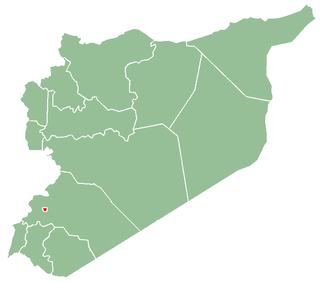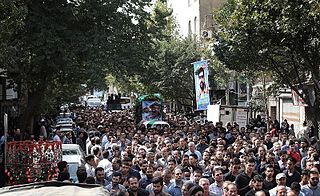
The Sayyida Zaynab Mosque is a mosque located in al-Sitt near the capital city of Damascus, Syria. Twelver Shia tradition considers the mosque to contain the grave of Zaynab bint Ali, the daughter of Ali and Fatima, and granddaughter of the Islamic prophet Muhammad.

Nabi Habeel Mosque, or "Mosque of the Prophet Abel", is a shrine dedicated to Habeel, located on the west mountains of Damascus, near the Zabadani Valley, overlooking the villages of the Barada river, in Syria, the Levant.

The 2008 Damascus car bombing was a car bombing that occurred on 27 September 2008 in the Syrian capital of Damascus. The explosion left 17 people dead and 14 injured. A car, laden with 200 kilograms of explosives detonated in the Sidi Kadad suburb of the capital, at approximately 8:45am. The blast occurred roughly 100 metres from a security installation on the road to Damascus International Airport at an intersection leading to the Sayyidah Zaynab Mosque, popular with Shia pilgrims from Iran and Lebanon. Security forces cordoned off the area.

Elsett is a city in the Rif Dimashq Governorate of Syria. Elsett is 10 km (6 mi) south of the country's capital Damascus. With a population of 136,427, it is the 10th most populous city in Syria and the most populous satellite city of Damascus. Administratively, the town is located in Markaz Rif Dimashq district and belongs to the Babbila subdistrict.

The Brigade of Abu al-Fadl al-Abbas, also known as the al-Abbas Brigade, is a Syrian Radical Jihadist Twelver Shia Muslim militant group operating throughout Syria. It is named after the nickname of Al-Abbas ibn Ali, son of Imam Ali.

The Rif Dimashq offensive was a Syrian government forces and allies offensive in the Rif Dimashq Governorate that was launched in late March 2013, as part of the Syrian Civil War.
The following lists events that happened during 2014 in Iraq.
The Lebanese people in Syria are people from Lebanon or those of Lebanese descent who live in the country of Syria. There are many prominent people in Syria who are of Lebanese descent.
Shia Muslims have been persecuted by the Islamic State, an Islamic extremist group, since 2014. Persecutions have taken place in Iraq, Syria, and other parts of the world.
On 21 February 2016, two car bombs struck exploded in the predominantly Alawite neighborhood of al-Zahra in Homs, Syria. The bombings killed at least 57 people and injured more than 100 others. At least 60 surrounding buildings and dozens of cars were destroyed in the blasts.
On 7 July 2016, at least 56 people were killed and 75 injured after a group of attackers stormed the Mausoleum of Sayid Mohammed bin Ali al-Hadi, a Shia holy site in Balad, Iraq. The attackers included suicide car bombers, suicide bombers on foot, and several gunmen. They attacked Shia pilgrims celebrating Eid al-Fitr, which marks the end of the Muslim holy month of Ramadan. There were three suicide bombers, and one of them was killed by security personnel. There were other attackers too. ISIL also launched several mortars into the area.

Al-Sayeda Zainab Mosque is a historic mosque in Cairo, Egypt, and constitutes one of the most important and biggest mosques in the history of Egypt. The name is an honor to Sayyidah Zaynab bint Ali, one of the daughters of Ali, fourth Caliph and first Shi'ite Imam, and his first wife Fatimah, daughter of the Islamic prophet Muhammad.

Holy Shrine Defenders, known in Persian as Modāfe'ān-e-Haram, is a phrase used by the Iranian government to refer to their advisers and military personnel, whether Iranians or otherwise, fighting in Iraq and Syria in defense and protection of Shia peoples and holy shrines often targeted by Sunni fighters. The most prominent shrine associated with the mission of the "holy shrine defenders," and to which their presence in Syria is ostensibly dedicated, is the Sayyidah Zaynab Mosque in Damascus.








